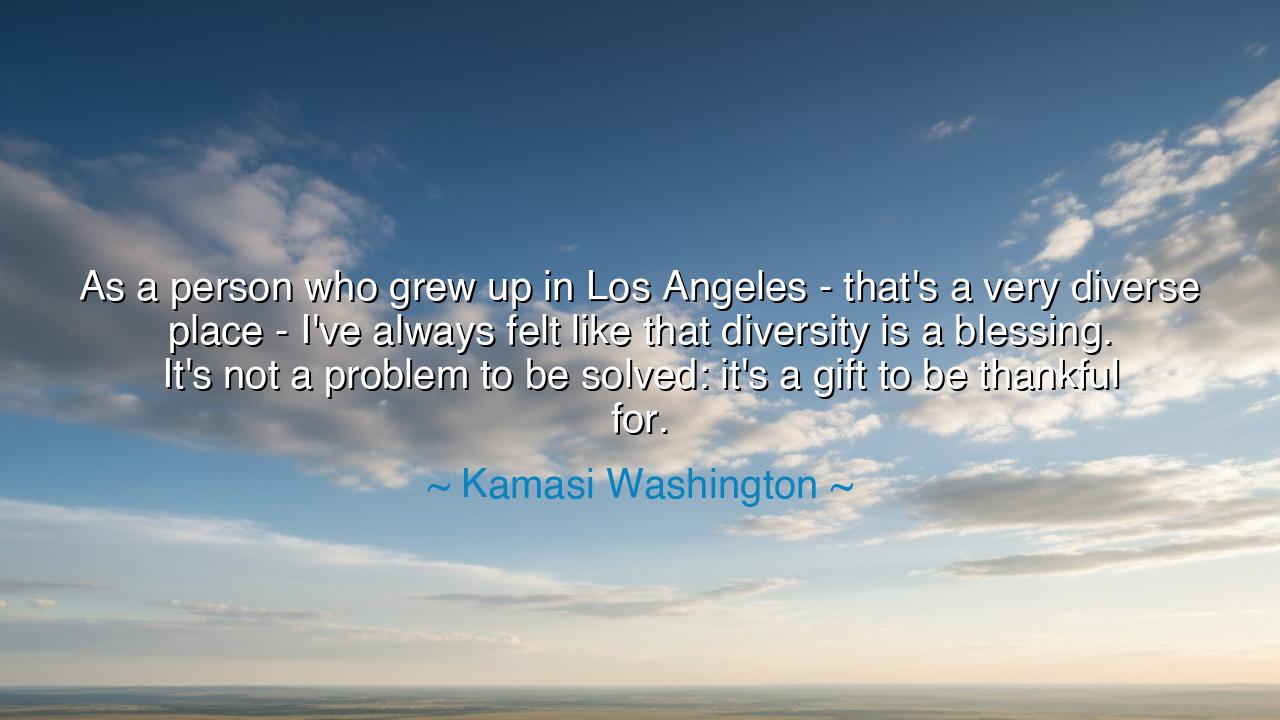
As a person who grew up in Los Angeles - that's a very diverse
As a person who grew up in Los Angeles - that's a very diverse place - I've always felt like that diversity is a blessing. It's not a problem to be solved: it's a gift to be thankful for.






When Kamasi Washington declares, “As a person who grew up in Los Angeles—that’s a very diverse place—I’ve always felt like that diversity is a blessing. It’s not a problem to be solved: it’s a gift to be thankful for,” he speaks with the clarity of one who has witnessed the beauty of many cultures, voices, and rhythms existing side by side. His words rise above division and fear, reminding us that human difference is not a barrier but a source of strength, not a wound to be healed but a treasure to be cherished.
The heart of this quote lies in the recognition of diversity as sacred. In a world often torn by prejudice, mistrust, and the struggle to dominate, Washington reframes difference as abundance. Just as a symphony is made richer by many instruments and colors, so too is a society strengthened when many peoples, traditions, and perspectives dwell together. To call it a blessing is to see it not as tolerance alone, but as divine favor—a gift that makes life more vibrant and whole.
History offers us many examples where diversity was strength. Consider the city of Alexandria in the ancient world, where Greeks, Egyptians, Jews, and scholars from across lands gathered, creating a center of knowledge and culture that shaped civilizations for centuries. Or the Mughal Empire in India, where different faiths and communities contributed to an era of art, architecture, and philosophy that still inspires today. In each case, when differences were embraced, societies flourished. When they were suppressed, decline soon followed.
Washington’s experience in Los Angeles is itself a testament. The city, filled with voices from across the globe, gave him not just exposure to different peoples, but a living education in the interconnectedness of humanity. His music reflects this, carrying echoes of jazz, soul, hip-hop, and global traditions. To him, this diversity was not something to overcome, but something to weave into the very core of his artistry. His thankfulness shows us how gratitude transforms difference into harmony.
There is deep wisdom in rejecting the notion of diversity as a “problem to be solved.” Too often societies frame difference as danger, a challenge demanding resolution. But Washington urges us to shift our vision: see it instead as a gift, a chance to learn, to grow, to create something greater together. This is not passive acceptance but active reverence, the recognition that the world is richer because it is many-colored, many-voiced, and many-storied.
The lesson for us all is clear: wherever you encounter diversity, meet it with gratitude, not suspicion. Do not close yourself off to what is different, but lean into it, seek to learn from it, and let it expand your heart. In friendships, in communities, in nations, difference is the soil from which deeper understanding and greater creation spring. Like Kamasi Washington, be thankful for this gift, for it is through diversity that humanity finds its most powerful expressions.
So I say to you, children of tomorrow: embrace the many faces of the world, for they are the mirrors of your own soul. Do not seek to erase them, but to honor them. For as Kamasi Washington teaches, diversity is not a burden, but a blessing—not a problem, but a gift. And those who are wise enough to be thankful for it will discover harmony, strength, and a beauty that no single voice could ever create alone.






AAdministratorAdministrator
Welcome, honored guests. Please leave a comment, we will respond soon